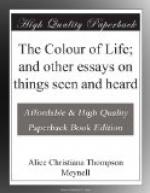He has grown into a smaller world as he has grown older. There are no more extremities. Recorded time has no more terrors. The unit of measure which he holds in his hand has become in his eyes a thing of paltry length. The discovery draws in the annals of mankind. He had thought them to be wide.
For a man has nothing whereby to order and place the floods, the states, the conquests, and the temples of the past, except only the measure which he holds. Call that measure a space of ten years. His first ten years had given him the illusion of a most august scale and measure. It was then that he conceived Antiquity. But now! Is it to a decade of ten such little years as these now in his hand—ten of his mature years—that men give the dignity of a century? They call it an age; but what if life shows now so small that the word age has lost its gravity?
In fact, when a child begins to know that there is a past, he has a most noble rod to measure it by—he has his own ten years. He attributes an overwhelming majesty to all recorded time. He confers distance. He, and he alone, bestows mystery. Remoteness is his. He creates more than mortal centuries. He sends armies fighting into the extremities of the past. He assigns the Parthenon to a hill of ages, and the temples of Upper Egypt to sidereal time.
If there were no child, there would be nothing old. He, having conceived old time, communicates a remembrance at least of the mystery to the mind of the man. The man perceives at last all the illusion, but he cannot forget what was his conviction when he was a child. He had once a persuasion of Antiquity. And this is not for nothing. The enormous undeception that comes upon him still leaves spaces in his mind.
But the undeception is rude work. The man receives successive shocks. It is as though one strained level eyes towards the horizon, and then were bidden to shorten his sight and to close his search within a poor half acre before his face. Now, it is that he suddenly perceives the hitherto remote, remote youth of his own parents to have been something familiarly near, so measured by his new standard; again, it is the coming of Attila that is displaced. Those ten last years of his have corrected the world. There needs no other rod than that ten years’ rod to chastise all the imaginations of the spirit of man. It makes history skip.
To have lived through any appreciable part of any century is to hold thenceforth a mere century cheap enough. But, it may be said, the mystery of change remains. Nay, it does not. Change that trudges through our own world—our contemporary world—is not very mysterious. We perceive its pace; it is a jog-trot. Even so, we now consider, jolted the changes of the past, with the same hurry.




